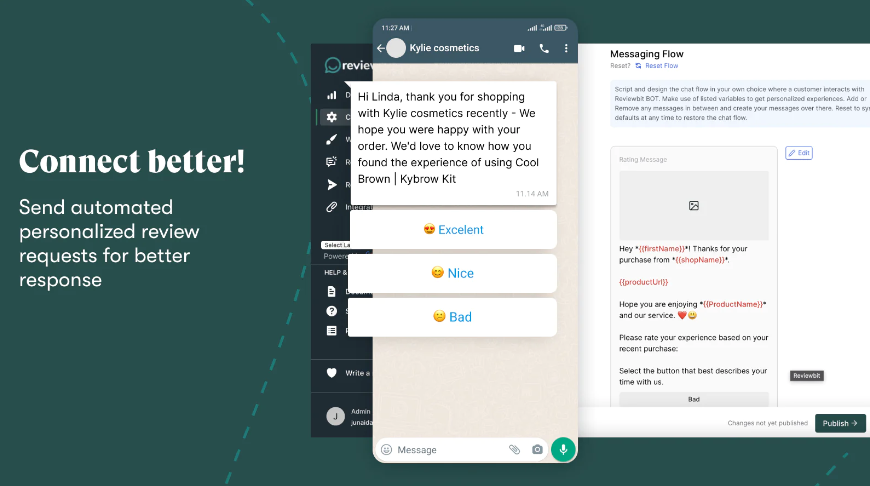Online reviews have become an integral part of our decision-making process when it comes to buying products or services. In fact, a survey conducted by BrightLocal found that 91% of consumers read online reviews before making a purchase or using a service. These reviews provide valuable insight into the quality of a business’s products or services, as well as the level of customer service they provide. However, not all reviews are positive, and handling negative feedback can be challenging for businesses. In this blog post, we’ll discuss the importance of responding to reviews and provide tips on how to handle negative feedback.
The importance of responding to reviews
One of the key reasons why businesses should respond to reviews is that it shows that they value their customers’ opinions and feedback. It also demonstrates that they are committed to providing excellent customer service. According to a survey conducted by ReviewTrackers, 53% of customers expect a response to their review within a week, and 63% are more likely to do business with a company that responds to reviews.
Additionally, responding to reviews can help improve a business’s online reputation. A survey by Womply found that businesses that respond to at least 25% of their reviews receive 35% more revenue than those that don’t respond to any reviews.
Why is monitoring reviews regularly essential?
Monitoring reviews regularly is essential for businesses that want to stay on top of their online reputation. By tracking reviews on platforms like Google, Yelp, and Facebook, businesses can quickly identify and respond to negative feedback, demonstrate their commitment to customer service, and show potential customers that they take their reputation seriously. Monitoring reviews can also provide businesses with valuable insights into customer preferences and behaviours, which can inform product development, marketing strategies, and more.
The role of customer feedback in business growth
Customer feedback is a crucial component of business growth, as it provides businesses with insights into the needs and preferences of their target audience. By soliciting feedback from customers through surveys, reviews, and other channels, businesses can gain a deeper understanding of what their customers want and need. This information can be used to improve existing products and services, develop new offerings, and tailor marketing strategies to better meet customer needs.
Additionally, positive customer feedback can be used to build a strong reputation online and attract new customers to the business. By incorporating customer feedback into their decision-making processes, businesses can ensure that they are meeting the needs of their target audience and positioning themselves for continued growth and success.
How to handle negative feedback
Receiving negative feedback can be tough, but it’s important to handle it in a professional and courteous manner. Here are some tips on how to handle negative feedback based on survey reports:
- Respond promptly: According to a survey by BrightLocal, 53% of customers expect a response to their negative review within a week. Responding promptly demonstrates that you take the customer’s concerns seriously.
- Apologise: A survey by ReviewTrackers found that 45% of customers are more likely to visit a business if they receive an apology in response to their negative review. Even if you don’t agree with the customer’s feedback, it’s important to apologise for any inconvenience they may have experienced.
- Offer a solution: A survey by Womply found that 33% of customers who received a response to their negative review changed their review to a positive one, and 34% deleted their original negative review. By offering a solution to the customer’s problem, you can turn a negative experience into a positive one.
- Take the conversation offline: If the customer’s concerns are particularly complex, it may be best to take the conversation offline. According to a survey by ReviewTrackers, 33% of customers would prefer to be contacted directly by the business in response to their negative review.
How will a review collection tool help you to manage negative reviews?
Review collection tools like Reviewbit play a crucial role in helping businesses to manage negative reviews. Here are some ways in which Reviewbit can be used to address negative feedback:
- Get notified of negative reviews: Reviewbit sends instant alerts to businesses when a negative review is posted, allowing them to respond quickly and efficiently. This ensures that the business is aware of negative feedback as soon as it’s posted and can take action to address the issue before it escalates.
- Respond to negative reviews: Reviewbit makes it easy to respond to negative reviews across multiple platforms from a single dashboard. This allows businesses to respond in a timely and efficient manner, demonstrating their commitment to customer service and potentially turning a negative experience into a positive one.
- Analyse negative feedback: Reviewbit provides businesses with valuable insights into the nature of negative feedback, including the specific issues that customers are experiencing. This information can be used to identify patterns and trends in negative feedback, allowing businesses to take targeted actions to improve their offerings.
- Improve online reputation: By using Reviewbit to manage negative reviews, businesses can improve their online reputation and build trust with potential customers. Reviewbit allows businesses to showcase their commitment to customer service and demonstrate their willingness to address negative feedback in a timely and efficient manner.
Overall, Reviewbit can be a powerful tool for businesses looking to manage their online reputation and address negative reviews. By using Reviewbit to monitor and respond to negative feedback, businesses can demonstrate their commitment to customer service and position themselves for continued growth and success.
Turning negative reviews into opportunities for improvement
Turning negative reviews into opportunities for improvement is a crucial aspect of managing a business’s online reputation. While negative reviews can be disheartening, they can also provide valuable feedback that businesses can use to improve their offerings and provide a better customer experience.
When businesses receive negative feedback, the first step is to acknowledge the issue and apologise for any inconvenience caused. This shows customers that the business takes their concerns seriously and is committed to addressing any issues that arise. It’s important to respond to negative reviews in a thoughtful and empathetic way, rather than getting defensive or dismissive.
Next, businesses should take steps to address the specific issues raised in the review. This might involve offering a refund or exchange, fixing a technical issue, or providing additional training to staff. By taking concrete actions to address the issue, businesses can show customers that they are committed to improving the quality of their offerings and ensuring that similar issues don’t arise in the future.
In some cases, businesses may also be able to turn a negative review into a positive experience for the customer. For example, if a customer complains about a product that didn’t meet their expectations, the business might offer a replacement product or a discount on a future purchase. By going above and beyond to address the issue, businesses can demonstrate their commitment to customer satisfaction and potentially turn a dissatisfied customer into a loyal one.
Overall, turning negative reviews into opportunities for improvement requires a commitment to customer service and a willingness to listen to customer feedback. By addressing issues raised in negative reviews and taking steps to improve the quality of their offerings, businesses can build a stronger reputation online and position themselves for continued growth and success.
Final thoughts
In conclusion, responding to reviews is essential for businesses looking to build their reputation and attract new customers. By handling negative feedback in a professional and courteous manner, you can turn a negative experience into a positive one and show that you value your customers’ feedback. According to a survey by BrightLocal, 87% of consumers say that a business’s response to a review is important when choosing a business to use. Therefore, it is crucial for businesses to respond to all reviews, including negative ones. By doing so, businesses can improve their online reputation, attract more customers, and ultimately, increase their revenue.







